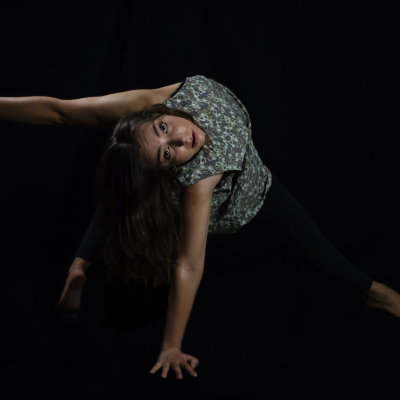MFA in Dance Welcomes its Fourth Cohort
The Duke Dance Program has welcomed its fourth MFA cohort to campus. Julia Piper and Angela Marina Arriaga are the latest multi-faceted artists to join the Master of Fine Arts in Dance: Embodied Interdisciplinary Praxis (MFAEIP) Program.
The Duke Dance MFAEIP is a two-year, full-time terminal degree program dedicated to expanding dance and embodied knowledge across cultures, communities, and contexts. The program endorses dance as a transformative force in society and engages students whose research centers around interdisciplinary experimentation.
The presence of these students on the Duke campus will undoubtedly multiply the number of contexts through which dance and performance matter in this contemporary moment. The Dance Program is excited to welcome Julia and Angela as the MFAEIP class of 2024.
The MFA application process for 2022 is now open, and competitive financial aid packages are available. For more information or to apply, please visit the website.
From Director Sarah Wilbur:
In my role as Dance faculty and Director of Graduate Studies, I’m excited to welcome Julia Piper and Angela Marina Arriaga to Duke as our next cohort of interdisciplinary dance artists.
Alongside our second year MFAEIP students Brooks Emanuel, Marika Niko, Leo Ryan and Zhixhuan “Miki” Zhu, the incoming cohort is amped up and ready to design models of movement-based research that connect with pressing social issues far beyond the arts.
I am confident that Julia’s investment in environmental justice messaging through dance and Angela’s passionate commitment to disability justice and queer worldmaking will offer critical perspectives as the Duke campus community continues to reckon with our collective roles and responsibilities to expose and dismantle pervasive systems of exclusion.
At Duke and elsewhere, artists are often at the forefront of shifting cultural, institutional and economic power toward more equitable and just worlds. Both our first- and second-year MFAEIP Dance cohorts are proving, time and again, the value of Duke’s investment in interdisciplinary collaboration, thought and action.
Duke Dance faculty wholeheartedly support these artists’ efforts to mobilize dance interventions that combat dehumanization in all of its forms. On behalf of our growing program, I want to personally encourage everyone from every corner of the campus to experience firsthand how a truly interdisciplinary take on movement research enables more people to see themselves in dance.
Angela Marina Arriaga
Hometown: San Diego, CA
Degree: B.A. English and Psychology, San Diego State University
Angela is a multi-media movement and performance artist with training in ballet, jazz, modern and aerial arts. She drifted from a movement practice during her undergraduate degree, during which her studies focused on queer theory and feminist and gender studies.
After completing her B.A., Angela relocated to Chicago to enter the professional world, but ultimately found her way back to dance. While in Chicago, she trained on scholarship at Joel Hall Dancers and Center and Chicago Movement Collective, and was mentored in somatics and Feldenkrais Method under Mary Szedga and Elizabeth Espinola.
MFAEIP Research
Angela will research the politics of the othered body and experiences of embodiment in queer identities and sex workers. I am also interested in exploring the body as an archive that holds cultural and ancestral memory and stores records of pain, injury, and trauma.
Angela plans to continue to engage with movement, understanding the body container for learning and site of knowledge through teaching and choreography. She is considering pursuing a Ph.D. in Performance Studies, depending on the path that her work takes her.
Why Duke University?
“I chose the MFAEIP program for its interdisciplinary nature and conviction to understanding dance as a research methodology that can expand beyond the discipline. The program provides space to explore how we can bring embodiment into the texts we read, the data we analyze and the words we speak, and to learn through a kaleidoscope of strategies such as reading, writing, moving, listening and resting.”
Julia Piper
Hometown: Ann Arbor, Michigan
Degree: B.A. Dance, with honors, minor in Environmental Studies, Goucher College
Julia has always loved the performing arts and spent much of her childhood training in music, dance and theatre. At Goucher College, she deepened her love for choreography and began an interest in combining her research on socio-political environmental issues with performance.
Since graduating, Julia has taught dance to people of all ages. She was director of dance at Baltimore Actors Theatre Conservatory, an instructor and interim director of dance at The St. Paul’s Schools and taught and performed through a multi-generational community building program: Dance & Bmore.
In addition, she has traveled to New York City, Washington, D.C., Germany and Italy to teach and perform with Eddie Stockton Collaborative Arts. She continues to choreograph for The Dance Conservatory at the St. Paul’s Schools and has received awards for her choreography at dance competitions.
MFAEIP Research
Julia’s research questions center around issues of environmental governance and how our perceptions of the Earth, resources and ourselves influence our (in)actions as a society. Her research is informed by cultural anthropology, communications and media and environmental ethics, and she explores how performance can play a role in communicating ideologies from other fields of research.
“I am interested in investigating how our identities shape environmentalism and exploring how we might shift to a more collective understanding of what it means to care for ourselves, our communities and the Earth.”
After graduation, Julia hopes to continue teaching, writing, and making.
Why Duke University?
“I felt confident that Duke was the single university program that could support my research endeavors, academic rigor and artistic goals. I am excited by the opportunity to pursue both movement and environmental studies, and contextualize my work in both academia and the arts world. I have never pigeonholed myself into one artform, or one field of study, so I am excited that Duke not only supports interdisciplinary work but also will provide incredible resources and mentors.”






